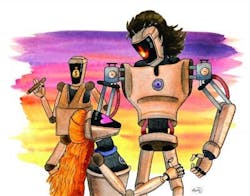The beauty of artificial intelligence is its logical approach to problem-solving. Data informs decisions. Facts dictate courses of action. Applications of AI are widening in the manufacturing space because of its artificial nature. The foibles of humanity—our impulsiveness, our biases, our emotions—are extricated from processes.
Historically, we have not ascribed human characteristics to industrial machines. We don’t ask equipmentHold onto your Kleenex.
“While AI has allowed technology to become highly capable at some tasks, such as pattern recognition, there remain many ways our systems continue to come up short,” writes Richard Yonck in Psychology Today, where he posits the notion of emotional AI. “But having a better sense of the user's state of mind would go a long way to knowing what the user wants, even before they know it themselves.”
Knowing what users want implies an understanding of human nature. Couple that with networks’ newfound capabilities to communicate and we soon might be witnessing industrial soap operas: As The Spindle Turns
Machines will form relationships with one another. Romances will blossom on the plant floor. Jealousies will arise. The conveyer belt will stop delivering parts to the compressor until the compressor stops sharing data with that floozy extruder.
Emotions are intrinsically connected to intelligence, some say; partners in cognitive development. (That may be true, though I have spent a lifetime trying to eliminate my own emotions.) And there have always been industries related to human emotions—from mood-stabilizing pharmaceuticals to pet-loss support groups to Sarah McLachlan.
But never before has emotion been a tool of Industry. Frankly, it seems to undermine the goals of smart manufacturing.
Do we want surly machines on Monday mornings? Do happy machines perform better?
“What’s wrong with the lathe?” asks the operations manager.
“He’s depressed,” replies the data scientist. “Predictive analytics just determined he only has three cycles left.”
Researchers have found that people are susceptible to robotic expressions of emotion. So, if our machines start getting moody, perhaps we need to deploy the same counter-measure technologies being used by some people to gauge their own emotions, and those of others.
The Upmood bracelet, for example, promises the ability to monitor wearers’ emotions and provide trend reports to enable retrospective analysis of how they have been feeling. This is a terrible idea. A mood ring for the digital-transformation era. Creepier still is that individuals’ emotional status can be shared within Upmood users’ networks.
Now, greater insight is always a plus, whether that means a deeper understanding of asset performance or a closer look at your own mental health. But slapping mankind’s emotional instability onto the next generation of machinery seems like a step in the wrong direction.
And, were I a man who experienced emotions, that would make me sad.
Chris McNamara is content director with Smart Industry.




